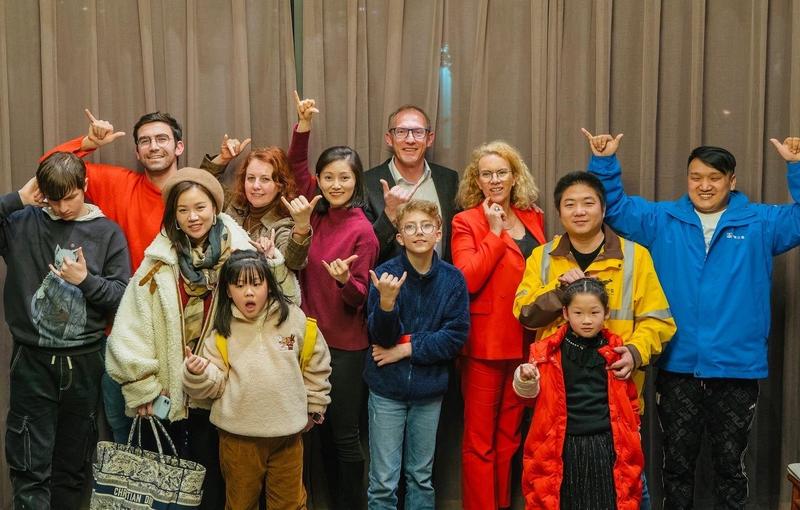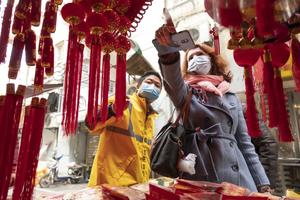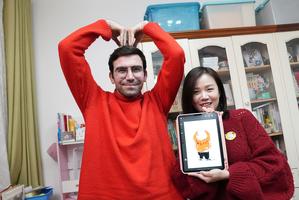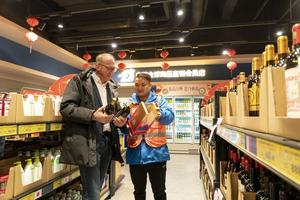Spring Festival good opportunity to reflect on challenging year
 Expatriates and local residents celebrate Spring Festival in Wuhan, capital of Hubei province. The city has recovered well after being hit hard by COVID-19 at the start of last year. (RAO RAO / XINHUA)
Expatriates and local residents celebrate Spring Festival in Wuhan, capital of Hubei province. The city has recovered well after being hit hard by COVID-19 at the start of last year. (RAO RAO / XINHUA)
French doctor Philippe Klein has worked in Wuhan, capital of Hubei province, for seven years, but he has just celebrated Spring Festival in the city for the first time.
He used to feel that he had little connection with local people, but things have changed over the past year.
"Maybe because of the pandemic, I now feel closer to the people in Wuhan," he said.
During a reunion dinner in the city with his family, Klein proposed a Lunar New Year's toast. Their guests were Sara Platto, an Italian associate professor of animal behavior and welfare at Jianghan University, her son Matteo, Israeli blogger and entrepreneur Raz Galor and other friends. Earlier, as they made preparations to mark the start of the Year of the Ox, they had the chance to experience the reignited spark of a city hit hard by COVID-19 at the start of last year.
In search of new clothes for Spring Festival, Platto and her son strolled along Hanjie Street, which was adorned with red banners and lanterns.
Meanwhile, Klein drove to a supermarket near his home to pick up some wine. He was accompanied by Wuhan resident Zhong Weiwei, a construction worker who helped build the city's Leishenshan makeshift hospital.
At the supermarket, festive songs were playing, discounted goods were on display and many colorful decorations dangled from the ceilings. After their health codes and temperatures were checked, Klein and Zhong lined up to buy the wine and baijiu.
Amid this busy scene, the two friends paused to remember just how hard Spring Festival had been last year, when a lockdown was enforced in the city as it battled to curb transmission of the novel coronavirus.
The 57-year-old Frenchman refused to leave Wuhan despite the uncertainty and fear he faced, along with the anguish of being separated from his family, who flew back to France."I am a doctor. It's my duty to help people here," he said.
 Italian professor Sara Platto shops with deliveryman Peng Zilong in Wuhan. (XIONG QI / XINHUA)
Italian professor Sara Platto shops with deliveryman Peng Zilong in Wuhan. (XIONG QI / XINHUA)
At the height of the outbreak in Wuhan, Klein was granted a permit that enabled him to move freely around the city to treat patients at home. "It was unforgettable. I remember there being nobody else on the roads but our ambulance," he said.
Zhong also remained in the city last year and did not go home for a family reunion.
Instead, he decided to join the workforce responsible for building the makeshift Leishenshan and Huoshenshan hospitals to treat COVID-19 patients.
"On Lunar New Year's Eve last year, all I did was slurp a bowl of instant noodles and hurry back to work," Zhong said, adding that for several weeks, he only slept for three hours or less a day.
"The feeling that our country was in danger, and the mutual goal and determination everyone had to build the hospitals, fueled and encouraged me," he said.
More than 40,000 construction workers, including Zhong, completed the hospitals in just two weeks, providing some 2,500 beds for COVID-19 patients in critical or severe condition.
Klein said: "Zhong is a real hero. It was really important to build such hospitals in the pandemic, and they did it very quickly. I think the rest of the world will never forget this."
Thanks to the introduction of a series of swift and effective measures, no new locally transmitted COVID-19 cases have been reported in Wuhan since May 18.
City residents' homes are once again filled with the sound of mahjong tiles being shuffled, laughter and the tantalizing aromas of home-cooked dishes and local delicacies.
 Israeli entrepreneur Raz Galor visits Li Jing, an illustrator in the city. (XIONG QI / XINHUA)
Israeli entrepreneur Raz Galor visits Li Jing, an illustrator in the city. (XIONG QI / XINHUA)
Solidarity, joint efforts
Last year, Galor, the Israeli entrepreneur, was in his home country during Spring Festival. However, he had no time to celebrate the occasion by eating his customary hotpot, because he was busy gathering medical supplies to be sent to hospitals in Hubei.
He was also occupied with something else. "For several days, all I did was confront the media about discriminatory reports aimed at Chinese people because of the virus," he said.
At the time, Galor, who is based in Beijing, felt the need for content to be produced "to make people more aware of the scientific situation, rather than a cultural situation where people are blaming others and being discriminatory".
"We needed more positivity and less hatred and blame," he said.
During these bleak times, Li Jing, an illustrator in Wuhan, was among the locals who contracted the virus and was admitted to a temporary hospital.
"I was transferred to a makeshift hospital, which used to be a gymnasium. Before I arrived there, I thought the place was going to be in a bad state and that they would lack medics. But it was the opposite. It was really great," Li said.
She also recalled how the doctors and nurses took good care of the patients.
As Li recovered, she began to draw pictures of doctors and patients going about their daily routines. She published her work on social media platforms, attracting considerable attention online.
Galor said, "Her artistic skills are amazing, but what impressed me more was her sheer optimism in the face of danger.
"She faced a lot of uncertainty at the height of the outbreak, but despite this, she managed to find hope to make the situation a little more positive," he added.
For Platto, the Italian professor, Spring Festival last year was also a time she will never forget.
"When the lockdown began in Wuhan on Jan 23, it was Matteo's birthday," the mother of one said.
She acted quickly, changing her son's birthday plans due to the lockdown. She ended up buying a cake and staging the party online.
During the lockdown, Platto relied heavily on deliverymen for groceries and other necessities.
"While we stayed safe at home, deliverymen were risking their lives every day to bring food and provisions to hospitals and the rest of the city. They are the heroes of this pandemic," she said.
 French doctor Philippe Klein buys wine and baijiu with local construction worker Zhong Weiwei. (XIONG QI / XINHUA)
French doctor Philippe Klein buys wine and baijiu with local construction worker Zhong Weiwei. (XIONG QI / XINHUA)
Just one year later, Platto goes shopping for clothes and groceries with one of the deliverymen, her new friend Peng Zilong.
Last year, Peng, 30, volunteered to take meals and daily essentials to hospitals across Wuhan.
This year, he decided to stay in city for Spring Festival, as due to the workload during the holiday, not everyone could go home. Peng forsook his own happiness to enable his colleagues to reunite with their families.
People were encouraged to spend Spring Festival this year in the towns and cities where they work.
Data from Wuhan Tianhe International Airport show that arrival and departure passenger traffic dropped by more than 60 percent compared with the same period in 2019.
Galor said: "I think Chinese people's willingness to make sacrifices for others is quite obvious-and not just in Wuhan. This year, people still made sacrifices by not going home."
Redefining a city
Having gone through so much during the height of the battle against COVID-19, Wuhan people have risen to the challenge and worked together to overcome tough obstacles.
But what next for these foreigners and locals, and what were their Spring Festival wishes?
As the outbreak waned, Li quit her job as an illustrator to become a full-time artist.
"There was a moment in the makeshift hospital when I suddenly felt reborn. I realized then that I have so many messages I want to communicate, so I hope I can spend more time creating art that will bring a smile and strength to others," she said.
Zhong and Peng, both self-confessed workaholics, want to spend more time with their loved ones.
Both Klein and Sara Platto developed deeper connections to Wuhan during the crisis and now fully embrace the city they call their second home.
Platto said: "My relationship with the city is like a friendship. During the outbreak and the lockdown, I decided to stay here. Therefore, my friend (Wuhan) became family, and that is what I feel about Wuhan now. It's like family."
In July, she published the book Buongiorno, Wuhan, in which she introduces the city to readers by recounting her son's experiences during the outbreak.
"I would like people outside China to see what Wuhan is really like," Platto said.
Klein, echoing her sentiments, said, "I hope that people will remember Wuhan as the city that fought the virus and triumphed against it with solidarity, courage and intelligence."
Xinhua's China Chat Studio exclusively for China Daily


